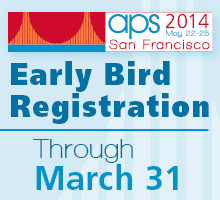How Science and Technology Can Help Each Other Flourish
 Psychological science and technology stand side by side as two of the fastest-growing areas of interest in the world, yet they rarely intersect or interact to mutually benefit one another. This Presidential Cross-Cutting Theme program at the 2014 APS Annual Convention, May 22–25 in San Francisco, will feature three subpanels on behavioral genetics, mobile sensing, and social networks. The subpanels and speakers include:
Psychological science and technology stand side by side as two of the fastest-growing areas of interest in the world, yet they rarely intersect or interact to mutually benefit one another. This Presidential Cross-Cutting Theme program at the 2014 APS Annual Convention, May 22–25 in San Francisco, will feature three subpanels on behavioral genetics, mobile sensing, and social networks. The subpanels and speakers include:
Behavioral Genetics
- APS Fellow Robert Krueger, a professor at the University of Minnesota whose research focuses on psychopathy and related behavioral issues;
- David Cesarini, a professor at the New York University department of Economics and Center for Experimental Social Science;
- S. Alexandra Burt, who studies the impact of gene-environment interaction on aggressive and rule-breaking behavior at Michigan State University; and
- Nicholas Eriksson, founder of 23andme, a company that tests DNA for ancestry.
Mobile Sensing
- Andrew T. Campbell, experimental computer scientist and professor at Dartmouth University;
- Rosalind W. Picard, founder and director of the Affective Computing Research Group at the Massachusetts Institute of Technology (MIT);
- Matthias R. Mehl, a social and personality psychologist and associate professor at the University of Arizona; and
- Ellen Konar, Mindset Works, which translates college courses into programs schools can use to increase student learning and enthusiasm.
Social Networks
- Megan A. Moreno, University of Washington;
- Ethan F. Kross, an assistant professor of social psychology at the University of Michigan; and
- Arturo Bejar, Facebook.





APS regularly opens certain online articles for discussion on our website. Effective February 2021, you must be a logged-in APS member to post comments. By posting a comment, you agree to our Community Guidelines and the display of your profile information, including your name and affiliation. Any opinions, findings, conclusions, or recommendations present in article comments are those of the writers and do not necessarily reflect the views of APS or the article’s author. For more information, please see our Community Guidelines.
Please login with your APS account to comment.